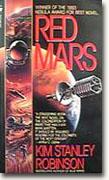

With this admonitory foray into a foreseeable future,
Kim Stanley Robinson won the 1993 Nebula Award for best novel.
In Red Mars, Robinson imagines the political, environmental,
and social implications of successful human colonization of the red planet.
With meticulous details and keen insight into human nature, of both the
individual and of groups, the author takes his readers on an odyssey of
titanic proportions, a tale that is a journey without a knowable conclusion.
 In 2026, a group of one hundred carefully selected scientists from
around the globe become the vanguard of Mars colonization. These visionaries
will grow to love and hate one another, to form coalitions and to break
them, to together mold the future of a planet. Carefully screened long
before launch, the select few endure a year in Antartica to determine
if they can make a tenable community. Coming out of that ordeal to
the satisfaction of mission psychologist Michel Duval, the first hundred
set off on the long trip to Mars.
In 2026, a group of one hundred carefully selected scientists from
around the globe become the vanguard of Mars colonization. These visionaries
will grow to love and hate one another, to form coalitions and to break
them, to together mold the future of a planet. Carefully screened long
before launch, the select few endure a year in Antartica to determine
if they can make a tenable community. Coming out of that ordeal to
the satisfaction of mission psychologist Michel Duval, the first hundred
set off on the long trip to Mars.
Through self-deception and subterfuge, the colonists navigate the
shoals of the psychiatric testing. But as they near their new home,
it becomes increasingly apparent that members of this first wave have
ideologies, passions, and political philosophies that will cause factions
to arise. Idiosyncracies become pronounced, jealousies develop, and
the first hundred becomes more and more fractured after landing safely
and beginning the long process of constructing outposts.
The politics and economics of Earth have followed this internationally
varied collection of intellectuals. Deep rifts occur between those who
want to make Mars another Earth and those who passionately believe that
Mars should remain unsullied to the fullest possible extent. Arguments
and feuds occur between those who want to make Mars fully accessible and
subject to the needs and desires of Earth and those who want to be fully
independent of the home planet. As more and more humans follow the
path of the first hundred, Martian soil will be rocked by explosive
acts of environmental and political terrorism, and the lives of many of
the first hundred will become forfeit in the struggle to determine the
fate of an entire planet.
Speculative-fiction patriarch Arthur C. Clarke called Red Mars
"the best novel on the colonization of Mars that has ever been written...
it should be required reading for the colonists of the next century."
Indeed, this is a story of the inevitable human struggle that constitutes the
history of our own planet, a series of cautionary and intelligent
what-ifs that could serve as a textbook for the many things to
be considered before we carry our earthbound rivalries and dreams outside
our own orbit.



 In 2026, a group of one hundred carefully selected scientists from
around the globe become the vanguard of Mars colonization. These visionaries
will grow to love and hate one another, to form coalitions and to break
them, to together mold the future of a planet. Carefully screened long
before launch, the select few endure a year in Antartica to determine
if they can make a tenable community. Coming out of that ordeal to
the satisfaction of mission psychologist Michel Duval, the first hundred
set off on the long trip to Mars.
In 2026, a group of one hundred carefully selected scientists from
around the globe become the vanguard of Mars colonization. These visionaries
will grow to love and hate one another, to form coalitions and to break
them, to together mold the future of a planet. Carefully screened long
before launch, the select few endure a year in Antartica to determine
if they can make a tenable community. Coming out of that ordeal to
the satisfaction of mission psychologist Michel Duval, the first hundred
set off on the long trip to Mars.